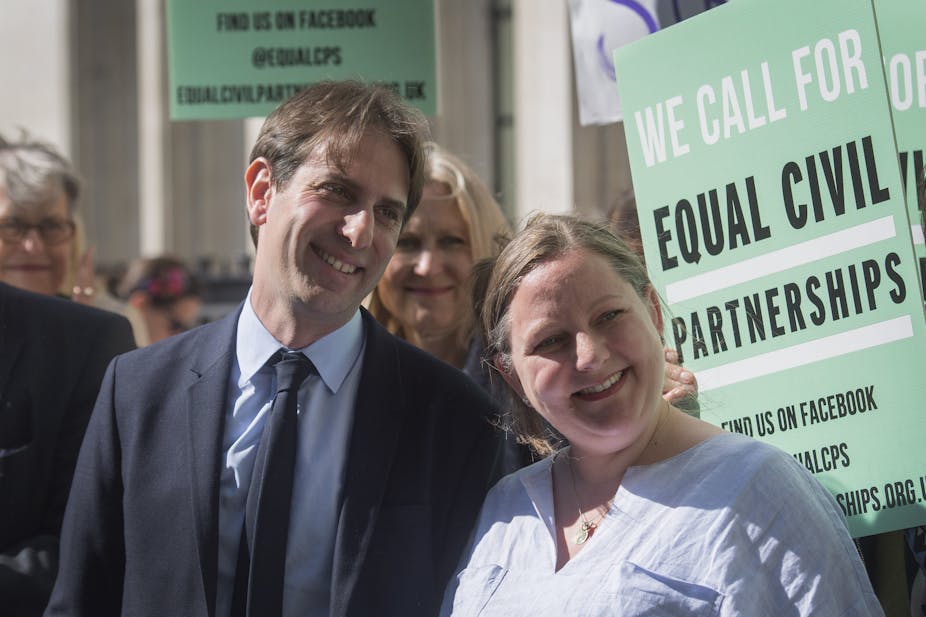Heterosexual couples in England and Wales will soon be allowed to enter into civil partnerships, formerly reserved for same-sex couples. Announcing the change, prime minister Theresa May explained that the change to the law would protect opposite-sex couples: “Who want to commit, want to formalise their relationship but don’t necessarily want to get married.”
May said the reforms would address the imbalance in the law and offer heterosexual and same-sex couples “the same choices in life”. At the moment, same-sex couples can choose to either marry under the Marriage (Same Sex Couples) Act 2013 or enter into a civil partnership, however, heterosexual couples are only able to enter into a marriage.
The Civil Partnership Act 2004 was introduced as a means for providing same-sex couples with the opportunity to formalise their relationships, but also to provide them with similar rights and protections as married heterosexual couples.
After a failed attempt to register a civil partnership, Rebecca Steinfeld and Charles Keidan began campaigning for civil partnerships to be extended to heterosexual couples as they had deep-rooted and genuine ideological objections to the institution of marriage. They defended their position stating:
We want to raise our child as equal partners and believe that a civil partnership – a modern, symmetrical institution – best reflects our beliefs.
They argued that preventing heterosexual couples from entering into a civil partnership was incompatible with the European Convention on Human Rights. In a ruling in June 2018, the UK Supreme Court unanimously agreed with Steinfeld and Keidan, concluding that:
The interests of the community in denying different sex couples … the opportunity to enter a civil partnership are unspecified … and the denial of those rights may have far-reaching consequences.
The government’s plan to change the law follows this Supreme Court ruling.
Cohabiting couples at risk
Some cohabiting couples in long-term relationships may believe they have the same rights and protections as married couples or civil partners, but this could not be further from the truth. The law treats cohabiting couples on the breakdown of the relationship or upon death as two unrelated individuals. This means they do not have the same guaranteed rights and protections as spouses or civil partners in terms of financial support and property rights upon separation or death and tax benefits.

In legal terms, civil partnerships and marriage are broadly similar. Once a couple has registered a civil partnership, each partner has an obligation to provide reasonable financial maintenance for the other both during the civil partnership and on its termination. The current law does not provide cohabiting couples with the same financial rights and obligations. The criteria set out in the Civil Partnership Act 2004 mirror those of the Matrimonial Causes Act 1973. This means in both types of union, the courts have the power to redistribute assets taking into consideration all the circumstances of the case.
Financial support for children is a responsibility that applies regardless of the relationship status of the parents. As civil partners, couples will have access to favourable tax relief and exemptions equal to those of married couples. For example, tax exemption for gifts between partners and certain exemptions from inheritance tax. Under the rules of intestacy, if a civil partner dies without leaving a will, the surviving partner is automatically entitled to a share of their partner’s estate.
Although there are some similarities between marriage and civil partnership, there are also some notable differences. While a marriage can be ended in divorce, a civil partnership would be dissolved. A dissolution is largely equivalent to a divorce, as the only ground for divorce is the irretrievable breakdown of the relationship, however, a civil partnership cannot be ended on the basis of adultery, while a marriage can.
The government will now consult on the technical aspects of the change in law though it has not provided a date for when these changes will be implemented. It is so far unclear whether there will be a significant number of couples entering into civil partnership, but at the very least the government has taken another step in recognising relationship statuses beyond marriage.

